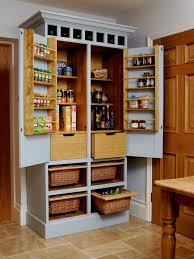
记忆方法
将“larder”分解为“lard”和“-er”。想象一个地方装满了“lard”(猪油),这个“lard”的聚集地就变成了“larder”,即一个储藏食品(特别是肉类和油脂)的房间。这种方法通过将单词与一个生动的场景关联起来,帮助记忆。
以上内容由AI生成, 仅供参考和借鉴
中文词源
larder 食物储藏柜
来自拉丁语lardum,猪油,熏肉。即放猪肉的地方,后词义通用化。
英语词源
- larder (n.)
- c. 1300, "supply of salt pork, bacon, and other meats," later in reference to the room for processing and storing such (late 14c.), from Anglo-French larder, Old French lardier "a place for meats," from Medieval Latin lardarium "a room for meats," from Latin lardum "lard, bacon" (see lard (n.)). Meaning "department of the royal household or of a monastic house in charge of stored meats" is mid-15c. Surname Lardner "person in charge of a larder" is attested from mid-12c.
权威例句
- 1. First you make dead, then you wish to rob his larder.
- 一开始,你先把那个人给弄死了, 这然后,你还想抢掠他的贮藏室.
- 2. There is the larder there. Make free with the food.
- 那里有个食品柜, 里面的食物请随意用吧.
- 3. Life was much larder in the aftermath of the war.
- 生活在战争的后续状况中更艰苦.
- 4. Billy just managed to scrape through the larder window.
- 比利勉勉强强地钻过了食品储藏室的窗户.
- 5. The cat somehow insinuated itself into the larder.
- 那只猫悄悄地溜进食品室.